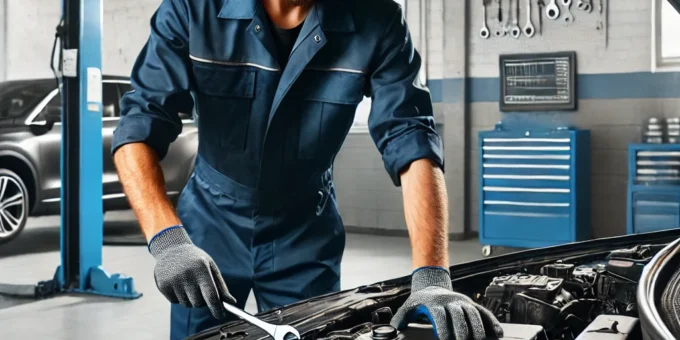
The Importance of Regular Car Maintenance
Keeping your vehicle in top condition is not just about avoiding breakdowns—it’s about safety, efficiency, and long-term savings. Regular car maintenance ensures that every component of your car functions optimally, reducing the risk of sudden failures that can lead to costly repairs.
From checking engine oil to inspecting brakes, routine servicing can extend the lifespan of your vehicle while improving fuel efficiency. When properly maintained, a car can run efficiently for years without major issues.
Comprehensive Auto Repair Services
When car trouble strikes, having access to professional auto repair services can make all the difference. Whether it’s an issue with the transmission, suspension, or electrical system, expert mechanics diagnose and fix problems efficiently.
Common Auto Repair Services:
- Engine diagnostics & repair – Resolving misfires, overheating, or stalling issues
- Brake system repair – Ensuring safe stopping power
- Transmission repair & replacement – Fixing shifting delays or slipping gears
- Electrical system repair – Addressing battery, alternator, and wiring issues
- Suspension & steering repair – Keeping your ride smooth and stable
Choosing a reliable auto repair service can save you from unnecessary expenses and headaches down the road.
Essential Car Maintenance Checklist
Preventative maintenance is the key to avoiding unexpected breakdowns. Here’s a checklist every car owner should follow:
Weekly Checks:
✔ Tire pressure and tread depth
✔ Engine oil levels
✔ Coolant and windshield washer fluid
Monthly Checks:
✔ Battery condition
✔ Brake fluid levels
✔ Lights and indicators
Every 3,000–5,000 Miles (or as per manual):
✔ Oil and oil filter change
✔ Air filter inspection
✔ Tire rotation and alignment check
Every 30,000–60,000 Miles:
✔ Transmission fluid replacement
✔ Brake pad and rotor inspection
✔ Timing belt replacement (if applicable)
Regular adherence to this checklist can keep your vehicle running at peak performance.
DIY Car Maintenance Tips for Beginners
While professional servicing is crucial, there are some maintenance tasks you can handle yourself.
- Check Engine Oil: Use the dipstick to ensure oil levels are within the recommended range.
- Replace Air Filter: A clogged air filter reduces engine efficiency; change it every 12,000–15,000 miles.
- Inspect Tire Condition: Look for uneven wear and ensure proper inflation to improve fuel efficiency.
- Clean Battery Terminals: Prevent corrosion by cleaning battery terminals with a baking soda solution.
- Check Wiper Blades: Replace worn-out wipers for clear visibility during rainy conditions.
Signs Your Car Needs Immediate Repair
Ignoring minor car issues can lead to significant problems later. Here are signs that indicate urgent attention is needed:
- Strange Noises: Squealing brakes, knocking engine, or grinding sounds indicate potential failures.
- Warning Lights on Dashboard: Check engine, oil pressure, or ABS light could signal underlying issues.
- Difficulty Starting the Car: A weak battery or faulty ignition system could be the culprit.
- Vibrations or Shaking: Problems with alignment, tires, or suspension could be causing instability.
- Burning Smell: Could indicate overheating, oil leaks, or electrical issues.
If you notice any of these warning signs, visiting a professional mechanic immediately is crucial.
Choosing the Right Auto Repair Shop
Selecting a trustworthy auto repair shop ensures that your car gets the best care. Here’s what to consider:
- Certifications: Look for ASE (Automotive Service Excellence) certified technicians.
- Customer Reviews: Check online ratings and testimonials.
- Warranty on Repairs: A good repair shop offers a warranty on parts and labor.
- Transparent Pricing: Avoid hidden fees by requesting an upfront quote.
A reliable repair shop will not only fix your car but also educate you on maintaining it properly.
How Preventative Maintenance Saves Money
Skipping routine maintenance can lead to expensive repairs. For instance, a simple oil change ($50-$100) prevents engine failure, which could cost thousands to fix. Regular brake inspections prevent costly rotor replacements, while timely tire rotations extend their lifespan.
Investing in preventative maintenance saves money in the long run by avoiding major breakdowns and improving fuel efficiency.
Conclusion
Expert car maintenance and repair services are essential for keeping your vehicle running efficiently and safely. By following a regular maintenance schedule, addressing minor issues promptly, and choosing a reliable auto repair shop, you can extend your car’s lifespan and prevent costly repairs.
Stay proactive with your car care, and it will reward you with reliability, better performance, and lower operating costs.